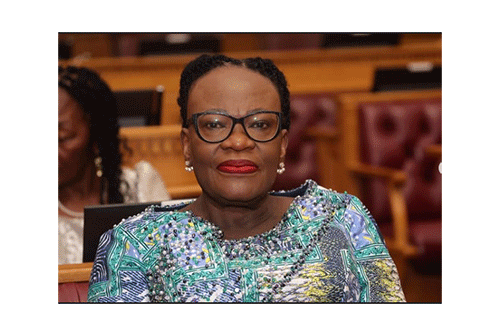Minister of International Relations and Trade, Selma Ashipala-Musavi, has issued a strong and determined call for unity and adaptability, as well as a reinforced focus on economic diplomacy.
Addressing staff during the ministry’s annual general meeting yesterday in Windhoek, Ashipala-Musavi laid out her vision for Namibia’s strengthened role in global trade and international relations.
The minister said the restructuring of the ministry reflects the government’s strategic vision, as directed by President Netumbo Nandi-Ndaitwah.
She noted that the integration of the former Ministry of Industrialisation and Trade into her ministry is not just an administrative change, but a strategic shift aimed at making Namibia a more competitive player in regional and global markets.
“The restructuring of our ministry reflects the strategic vision of our government to enhance our nation’s economic diplomacy and expand Namibia’s footprint in the continental and global economy,” she said.
She called on staff to embrace this transition with openness, recognising the expertise and new perspectives their colleagues from the trade sector bring.
The minister encouraged the ministry’s personnel to work together in consolidating expertise, streamlining operations, and maximising efficiency.
Ashipala-Musavi laid out Namibia’s strategic approach to economic diplomacy, emphasising the importance of regional and continental trade agreements such as the African Continental Free Trade Area (AfCFTA).
She stressed that for Namibia to take full advantage of AfCFTA, the country must enhance its trade capabilities by diversifying markets and focusing on areas where Namibia holds a competitive advantage.
Expanding Namibia’s footprint in key sectors such as agriculture, mining, renewable energy, logistics, and trade in services—including tourism, financial services, transportation, and communication—will be critical to positioning the country as a regional economic leader.
Economic diplomacy
Ashipala-Musavi placed a strong emphasis on the African Continental Free Trade Area (AfCFTA) as a key mechanism for Namibia’s economic expansion.
“This transition is critical for fostering coordinated efforts in our economic diplomacy, with a strong focus on regional and continental integration,” she said.
The minister made it clear that Namibia must actively leverage its strengths to unlock the full potential of AfCFTA, stating, “Namibia must focus on enhancing its trade capabilities through market diversification, focusing on priority areas where competitive advantage exists.”
She also underlined the importance of strengthening trade relationships through bilateral and multilateral cooperation, ensuring that Namibia’s engagement on the global stage translates into tangible economic benefits.
Accountability
Ashipala-Musavi urged ministry staff to take their roles seriously and embrace the broader mandate with dedication.
“Every department, directorate, and division in the ministry is critical to the fulfilment of the mandate of the ministry, and therefore, we must all take our work with seriousness,” she stated. She emphasised that the government and the people of Namibia expect improved service delivery, particularly in rural areas.
She also stressed the importance of proactive and effective communication, particularly in digital diplomacy.
As the ministry transitions into its expanded structure, Ashipala-Musavi reassured staff of continuous support from leadership. “Over the coming days, the political leadership, together with management, will work closely with all departments and directorates to ensure a smooth transition,” she said. She encouraged an open dialogue to address any concerns and ensure clarity in roles and expectations.
Ashipala-Musavi made it clear that every diplomatic effort must yield real results. Trade missions, she stressed, should not merely be symbolic but must lead to concrete investments, business ventures, and job creation for Namibians.



